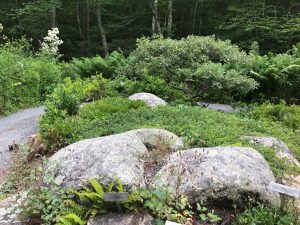
- This event has passed.
Resilient Landscapes in Built Environments Section I
February 14, 2023 @ 9:30 am - 2:30 pm
 Tuesday, February 14 from 9:30 a.m. – 2:30 p.m.;
Tuesday, February 14 from 9:30 a.m. – 2:30 p.m.;
Tuesday, February 28 from 9:30 a.m. – 2:30 p.m.;
Tuesday, March 7 from 9:30 a.m. – 2:30 p.m.;
Tuesday, March 14 from 9:30 a.m. – 2:30 p.m.
Incorporating low-maintenance design and high-performance results, resilient landscapes sustain and regenerate under stressful environmental conditions rather than falling victim to stressors. These are aesthetic powerhouse systems providing ecological services, giving the landscape professional the opportunity to evolve their business and adapt to the changing environment. This course, Design and Structural Components, offered in four topical sessions, will examine the design process and factors inclusive of ecological principles, processes, and materials in order to create systems that are resilient and regenerative.
Day one begins with Ecological Design for Resilience (Lisa Cowan) which introduces the site-based ecological frameworks and design strategies that inform the development and management of resilient landscapes. Whether transitioning from an environmentally degraded urban site or a conventionally managed backyard, every landscape has the potential to contribute to the fight against climate change. Focusing on using site documentation, inventory, and analysis to create an ecological baseline for design proposals, students will consider how soils, topography, and climate shape growing conditions for different native plant communities and how to develop landforms, drainage networks, circulation patterns, and plant palettes that support both human and wildlife habitats. In this interactive class, students will expand on lecture content through discussion and analysis of select case studies.
Day two, Applied Soils: Restore and Engineer (Bruce Hoskins & Anthony Will) examines soils via the perspective of a landscape practitioner as they examine a jobsite: soil health and fertility, restoration solutions for degraded soils, proper sourcing of any transported or engineered soils, and long-term soil management practices. Through sample lab results and case studies, discussion will include an overview of soil biology and chemistry, carbon sequestration and filtration of urban inputs, specific engineered blends for function, and lessons of sustainable agriculture applied to residential applications.
Day three, Systematic Solutions to Water Management (Trevor Smith), explores methods and materials that capture and reuse stormwater as well as other management solutions for stormwater runoff. Class will also identify updated materials and best practices for irrigation that result in water conservation, reduced poly-made materials, and hardier, healthier plants.
Day four, Sustainable Materials (David Homa) will examine multiple methods of erosion control, discuss biodegradable materials to apply both to and above the soil, explore innovative concepts that utilize locally derived and repurposed materials, and examine what materials are most effective for a variety of settings. Class content will focus on features such as fences, access ways, patios, ponds, swales, stone walls, and terraces.
Lisa Cowan, PLA, SITES AP is the Principal and founder of Studioverde, a leading nature-based sustainable design and consulting landscape architecture practice. With qualifications in ecological design, Lisa has successfully led teams on complex projects that resulted in collaborative design solutions that achieved multiple economic, environmental, and social benefits. She serves on the Executive Committee for the Boston Society of Landscape Architects and is an officer in ASLA’s Sustainable Design Professional Network. Lisa Cowan’s firm is nationally recognized for Sustainable Sites Initiative (SITES) leadership, a land-based certification program that employs a “Green” rating system for ecological sensitive design and implementation in built environments.
Bruce Hoskins is the lead soil scientist and program coordinator for the University of Maine’s Soil Testing and Analytical Laboratory, completing 15,000 soil tests a year. Mr. Hoskins teaches and specializes in soil chemistry, soil health, and plant nutrition for the University of Maine at Orono. Many landscape contractors, city and town municipalities, and soil engineer firms use the services of the Soil Testing and Analytical Lab for their commercial and residential projects throughout the northeast.
Anthony “Tony” Will is Director of Marketing & New Product Development at Read Custom Soils and former President of A. A. Will Sand & Gravel Corp. Read Custom Soils manufactures precision blended soils for demanding applications: lightweight planting media for green roofs, structural soils for urban tree planting, stabilized soils for ADA-compliant natural paths, reinforced soils for grass fire-lanes and turf parking, professional grade baseball infield mixes, “high use” lawn loam, bioretention soils for rain gardens, plus topdressing sand and custom rootzone blends for golf courses and athletic fields.
Trevor Smith specializes in green stormwater infrastructure such as permeable pavers and rain gardens, as well as in landscapes designed to maximize Earth’s systems while balancing them with the needs and desires of her human inhabitants. Mr. Smith is equally driven by both the form and function of his landscape designs. He is passionate about the natural world which inspires his commitment to ecological principles and practices and is devoted to creating beautiful landscapes that provide clients with an oasis in which to reconnect with the natural world. Mr. Smith holds several landscape certifications, including MCH, NOFA AOLCP, LEED GA, and IPCI; he is also a past President of the Ecological Landscape Alliance and a current Trustee.
David Homa is a certified permaculture designer and consultant, educator, and professional ecological landscaper. Located in Otisfield, ME, David owns Post Carbon Designs, specializing in regenerative and sustainable landscapes. He instructs for the Resilience Hub in Portland and has been designing edible and ecological landscapes throughout Southern Maine for over a decade.